-for-the-latest-international-classification-of-.jpg?sfvrsn=f17be284_13)
Health Professionals and Medical Recorders Trained on International Classification of Disease 11th Revision (ICD-11)
12-20 November; 28 November-6 December; 7-15 December | Province 1 and Bagmati Province - The Ministry of Health and Population (MoHP) organized trainings for the latest International Classification of Diseases (ICD)’s 11th Revision - a uniform standard for recording health information electronically. WHO has recommended member countries to embark on ICD-11 from January 2022. Orientations were given to 45 medical record personnel. Six trainers were selected from the recorders who further trained 53 personnel. All trainees from federal, provincial, district hospitals, as well as medical colleges, were trained in the events led by Department of Health Services, MoHP; facilitated by B.P. Koirala Institute of Health Sciences; and financially and technically supported by WHO. Recorders were trained on how to input following new standards which enables proper analysis and reporting of health trends; map diseases causes of deaths; ease sharing across information systems, health facilities, and regions; and support evidence-based decision-making for health care. The event also familiarized the participants to medical certification of cause of death and coding compliance. MoHP is planning a national rollout of ICD-11.

7000 vials of Liposomal Amphotericin B handed over to MoHP
Kathmandu, Bagmati Province | 6 December – WHO, Country Office for Nepal, handed over 7000 vials of Liposomal Amphotericin B to the Department of Health Services, Ministry of Health and Population (MoHP). The medicinal vials were procured upon the request of MoHP after a rise in cases of mucormycosis among COVID-19 patients in Nepal. Mucormycosis is a serious fungal infection, usually affecting people who are immunocompromised, or patients already infected with other diseases. The medicines, purchased with the financial support from the German Ministry of Health, will be provided to treatment centers as per their referrals. WHO, Country Office for Nepal, will continue to collaborate closely with different partners and health officials to strengthen national response towards the COVID-19 pandemic and improve public health in Nepal.
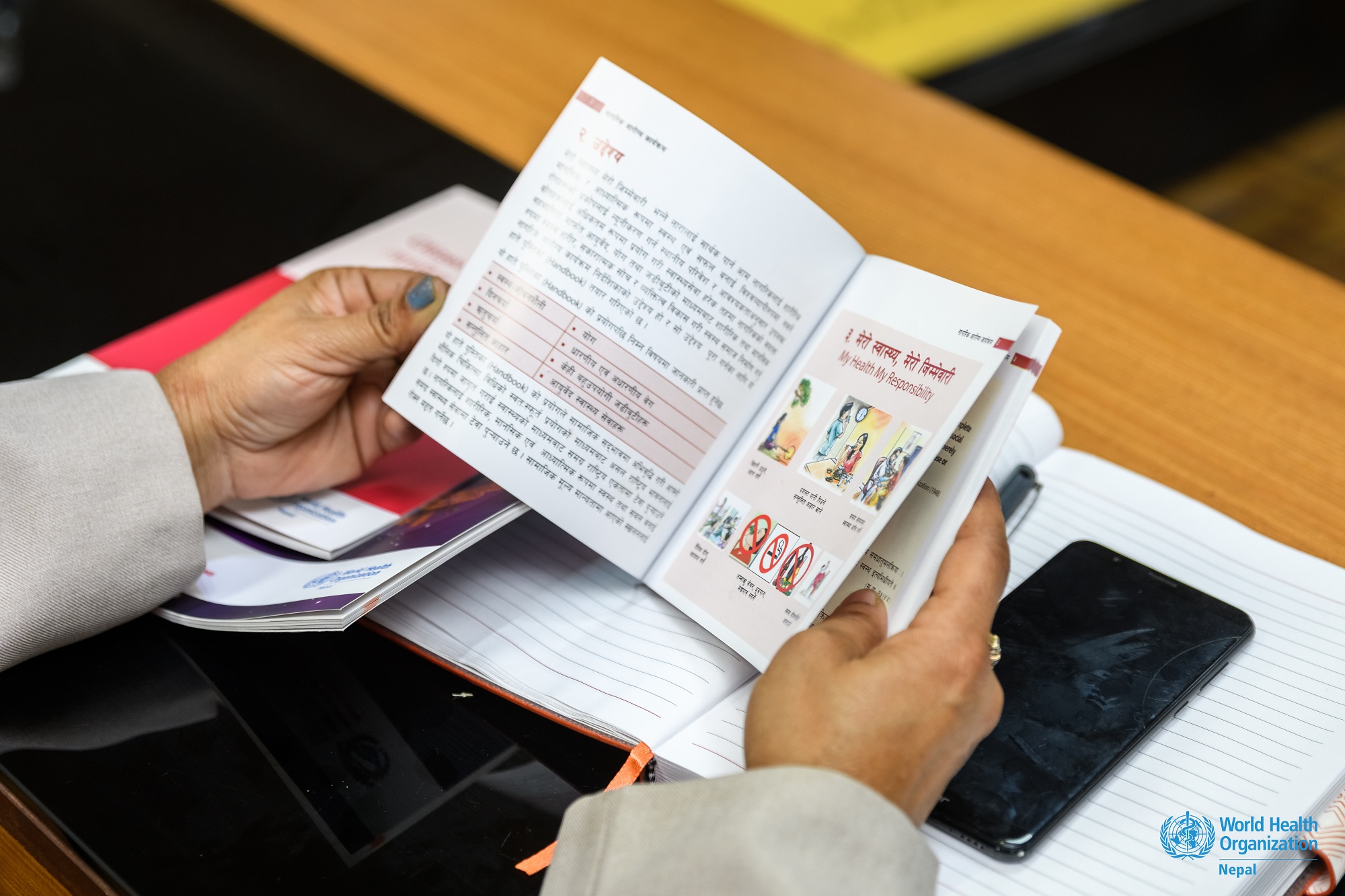
Citizen Well-being Plan Launched
Kathmandu, Bagmati Province | 3 December - The Department of Ayurveda and Alternative Medicine, Ministry of Health and Population (MoHP), launched the Citizen Well-being Plan, an activity in line with MoHP’s National Action Plan on accelerating Sustainable Development Goals and Universal Health Coverage. A pocketbook and video clip to promote well-being and healthy lifestyles were also disseminated. Amid growing concern for rising lifestyle-related diseases, the plan promotes Ayurveda, yoga, meditation, and healthy activities which can be maintained at home with family. These technical products with the theme “My Health My Responsibility” were developed with the technical support of WHO, Country Office Nepal, and incorporate the expertise of Ayurveda Physicians from the Ministry of Social development from all 7 provinces and Ayurveda experts. The guidelines will be used to develop and implement strategic plans across provinces and municipalities.
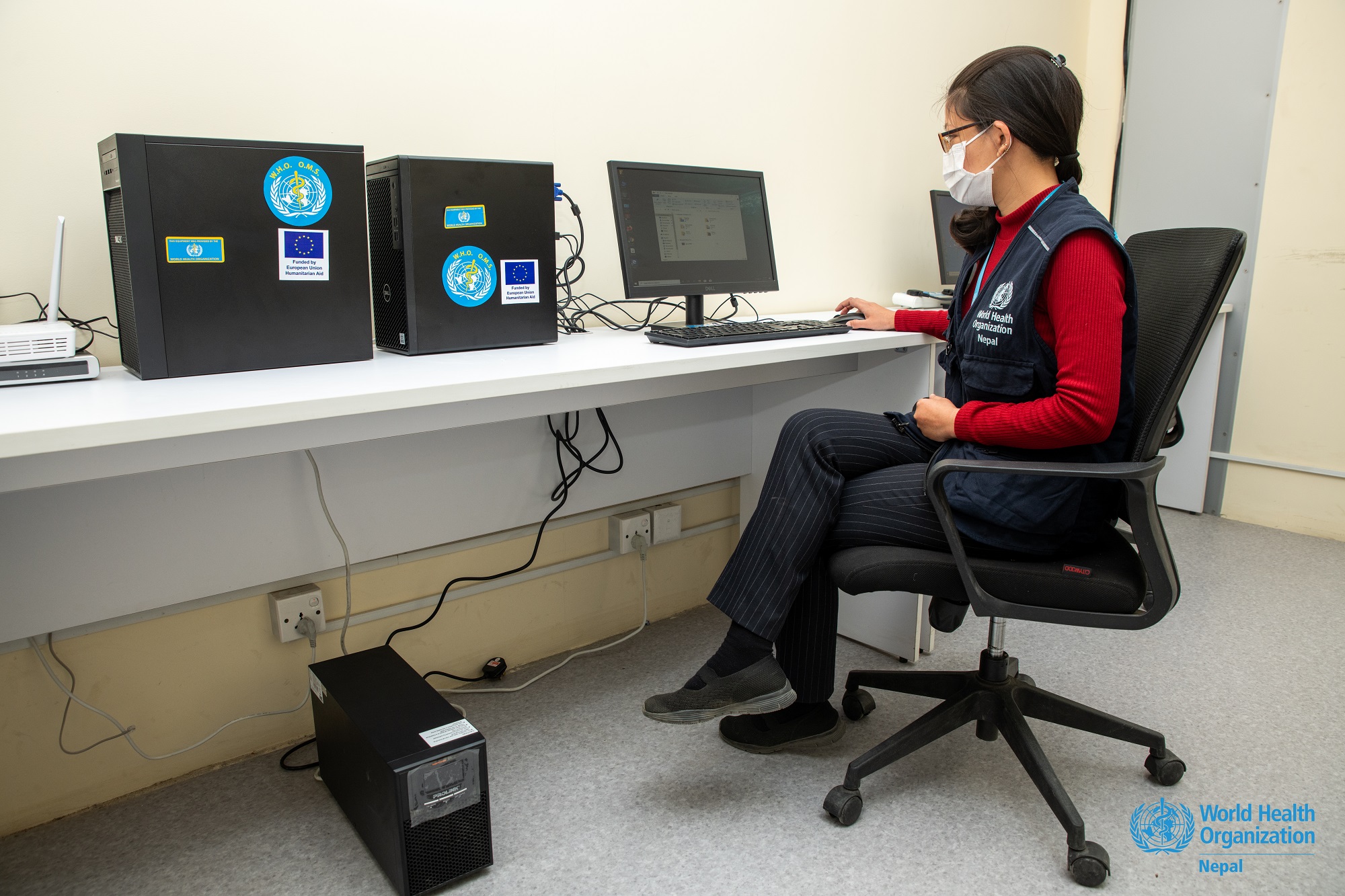
Teleconsultation Center Launched at Bir Hospital
Kathmandu, Bagmati Province | 2 December – The Ministry of Health and Population (MoHP) and WHO, Country Office for Nepal, launched the first teleconsultation centre at Bir Hospital. The centre, funded by EU Humanitarian Aid, will enhance the capacity at the COVID-19 Unified Central Hospital. The public can call 1133, a toll-free number, and receive medical advise from licensed doctors for ailments other than COVID-19 as well. The free health consultations will support the hospital to provide timely, accessible, affordable, and equitable diagnosis, which will be beneficial for people living in remote areas. WHO, Country Office for Nepal, has been technically supporting the centre, financially supporting the infrastructure, and training human resource to run the center. WHO, Country Office for Nepal, also plans to integrate teleconsultation with existing 8 telemedicine centers in Nepal. WHO has recently supported the MoHP to establish 7 Provincial Telemedicine centres and 1 Central Telemedicine Centre.
-and-workload-indicators-of-staffing-need-(wisn)-results-nepal.jpg?sfvrsn=430a95fa_7)
Dissemination program on National Human Resource for Health Strategy (2021-2030) and Workload Indicators of Staffing Need (WISN) Results
Lalitpur, Bagmati Province | November 19 - The Ministry of Health and Population (MoHP) and WHO, Country Office for Nepal, jointly released the National Human Resource for Health (HRH) Strategy (2021-2030) and Workload Indicators of Staffing Need (WISN) Results. This strategy has been developed in line with Global HRH Strategy; Regional HRH Strategy; National Health Policy, Acts, Regulation; and Sustainable Development Goals with aim to advance Universal Health Coverage. This strategy will provide guidance to federal, provincial, and local governments to make better planning and management for human resources for health, and will help stakeholders make better evidence-based planning and decision with an efficient HRH information system. Lessons from the COVID-19 pandemic will also be incorporated in the document. A WISN tool was piloted in nine primary health care facilities across Bagmati, Gandaki, and Sudurpaschim provinces after a Training of Trainers (ToT) on WISN was completed in 2019 with support from WHO SEARO.
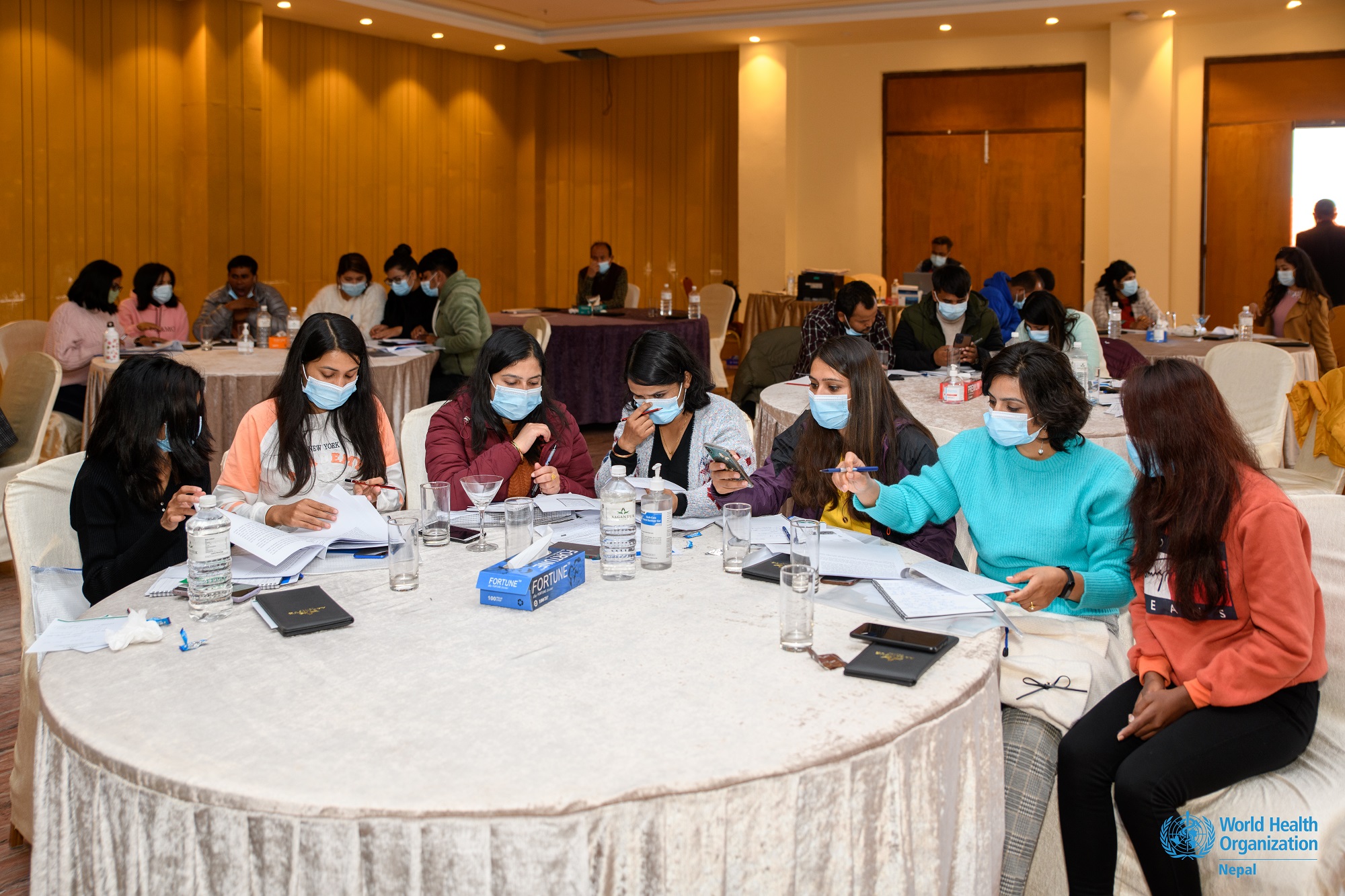
Workshop on responsible media reporting on suicide held
Dhulikhel, Bagmati Province | November 15-16 - At least 30 media persons were trained on the best practices of responsible media reporting on suicide and attempted suicide by The Epidemiology and Disease Control Division, Ministry of Health and Population. The event, supported by the WHO, Country Office for Nepal, saw representatives from the National Health Education Information and Communication Centre, Press Council Nepal, Federation of Nepali Journalists, editors and reporters from various Nepali publications, and mental health experts. The event highlighted the relationship between the media and public health interventions, with discussions on mental health promotion. Nepali translation of WHO media guideline on ‘Responsible Reporting on Suicide’ was also reviewed which will be adapted to fit the national need. Further plans to roll out the national guideline, undertake regular media monitoring on published stories, and systematically engage with journalists working across the country were also drafted.
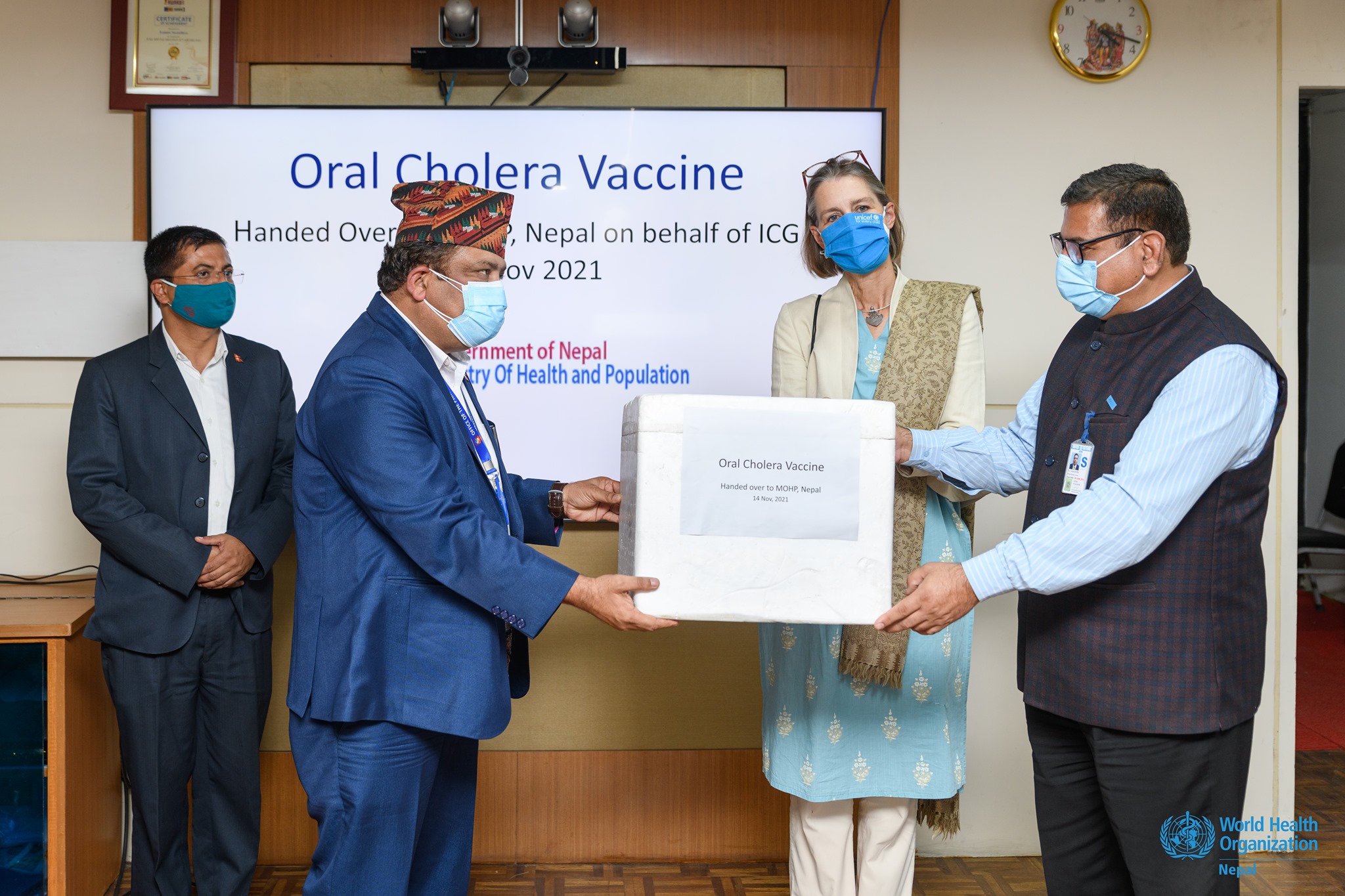
252,363 doses of Oral Cholera Vaccines (OCV) handed over to Ministry of Health and Population
Kathmandu, Bagmati Province | November 14 - On behalf of the International Coordinating Group of vaccines (ICG) Geneva, World Health Organization (WHO) and UNICEF handed over 252,363 doses of Oral Cholera Vaccines (OCV) to the Secretary of Ministry of Health and Population. These vaccines will be critical to respond to the ongoing cholera outbreak in Kapilvastu Municipality and nearby areas of Lumbini province. Rapid vaccination with OCV, along with improving water and sanitation, will help to contain the outbreak and save lives. WHO, Country Office for Nepal, will continue to collaborate closely with different partners and health officials to improve public health in Nepal.
-2021-sixth-edition-launched_nepal.jpg?sfvrsn=ae25445_11)
National List of Essential Medicines (2021), Sixth Edition Released
Kathmandu, Bagmati Province | November 8 – Department of Drug Administration, Ministry of Health and Population, released the sixth edition of the National List of Essential Medicines (NLEM) during a policy dialogue meeting on medicine regulation in Nepal. Hon'ble Health Minister, Mr. Birodh Khatiwada, released the NLEM (2021) at the event. The publication was technically and financially supported by WHO, Country Office for Nepal. The list contains 398 drug molecules in different therapeutic categories which are needed for a basic healthcare system. They were selected with due regard to disease prevalence, public health relevance, evidence of efficacy, safety, comparative cost-effectiveness. During the launch, dignitaries noted that the publication is an important tool for the management of medicines and rationalizing prescription in the country as envisioned by the National Health Policy 2076, and appealed to healthcare workers to follow the defined guidelines.

Meeting held to deliberate on the integration of Influenza and SARS-Cov-2 surveillance in Nepal
Kathmandu, Bagmati Province | October 27-28 – A meeting with provincial representatives from health directorate offices, provincial public health laboratories (PPHLs), provincial hospitals, and the sentinel sites of the National Influenza Surveillance Network, was organized by the National Influenza Centre (NIC) at National Public Health Laboratory (NPHL), Ministry of Health and Population (MoHP), with support from WHO, Country Office for Nepal, to introduce integrated influenza and SARS-CoV-2 surveillance in Nepal. Participants deliberated the expansion of Influenza SARS-CoV-2 dual testing to provincial public health laboratories. The plan includes linking designated sentinel sites including provincial hospitals to respective PPHLs or NPHL based on their accessibility. Participants proposed a revised sentinel site network for the integrated Influenza and SARS-CoV-2 surveillance network. Epidemiological and clinical data collection tools, surveillance data reporting platforms, and preparedness strategies for acute respiratory infection for future integration of other respiratory viruses in the surveillance, were also discussed.

COVID-19 Expert Group Committee meeting held
Bhaktapur, Bagmati Province | October 21-22 - A meeting of COVID-19 Expert Group Committee was held with the objective to review and update the guidelines and protocols related to COVID-19 response in the country. Participants at the meetings included chief specialists, directors, high level officials, and other representatives from Ministry of Health and Population, Department of Health Services, National Health Research Council, National Public Health Laboratory, HERD International, WHO, Country Office for Nepal, and other medical institutions as experts. Members of the expert group committee were divided into 4 sub-groups who reviewed the COVID-19 response protocols and guidelines, COVID-19 treatment and management guidelines, COVID-19 treatment and reimbursement guidelines, and public health surveillance and research guidelines. The committee concluded on the need for evidence-based guidelines and protocols to be regularly updated and uniformly disseminated to the local level.
-2021-commemorated_october-24_nepal.jpg?sfvrsn=3513cc66_7)
International Lead Poisoning Prevention Week (ILPPW) 2021 Commemorated
Kathmandu, Bagmati Province | October 24 - ILPPW 2021 was commemorated with a stakeholder workshop on effective implementation of lead paint standard to minimize lead poisoning in Nepal. The workshop, organized by Centre for Public Health and Environmental Development (CEPHED), with support from Ministry of Health and Population (MoHP) and WHO, Country Office for Nepal, included participation from government ministries, municipalities, academia, paint manufacturers, civil society, and media. Participants called on the need for effective implementation of lead standard compliance and commitments from private sector on producing lead-free paint; stressed on strengthening of related monitoring mechanism; and emphasized multi-sectoral collaboration. National reports and presentations on lead paints, its compliance status in Nepal, and the way forward to implement the findings from the reports were shared, alongside WHO initiatives towards prevention and control of harmful lead exposure.
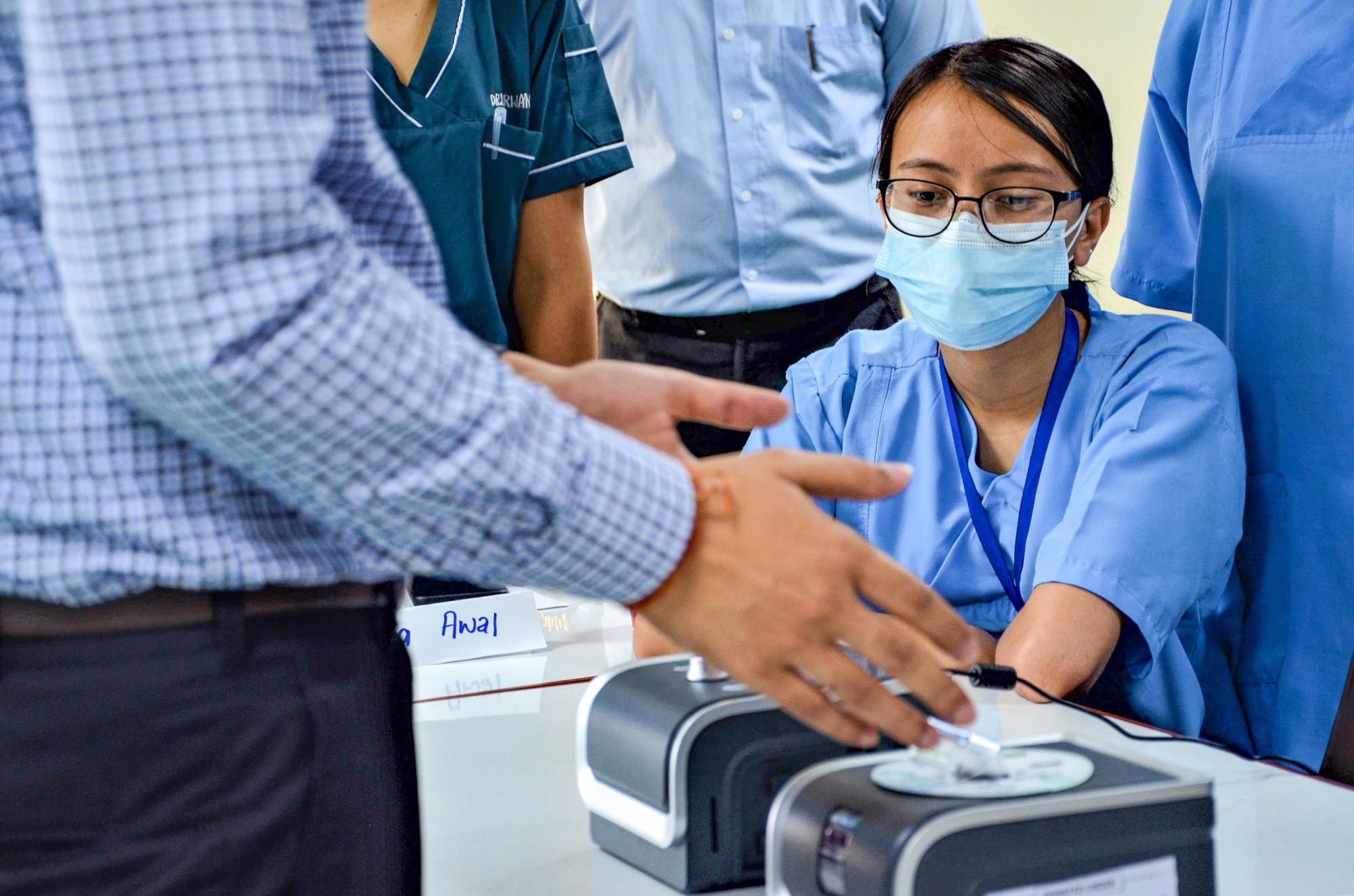
Medical officers and nurses trained on biomedical equipment
Kathmandu and Bhaktapur, Bagmati Province | September 30, October 1, 4, 5, 7, 8 - With the aim to enhance the capacity of healthcare workers in the use and management of biomedical equipment, 21 medical officers and the staff nurses from Bhaktapur Hopital and Civil Hospital were trained on its usage by National Health Training Center (NHTC), Ministry of Health and Population (MoHP). The four-day training, organized with support from WHO, Country Office for Nepal, at Bhaktapur Hospital and Civil Hospital, focused on handling of equipment such as CPAP, BiPAP Machine, ventilator, oxygen concentrator, and oxygen cylinders. NHTC and WHO, Country Office for Nepal, are now planning to roll out similar training in the provinces. For this purpose, a training of trainers was also held.
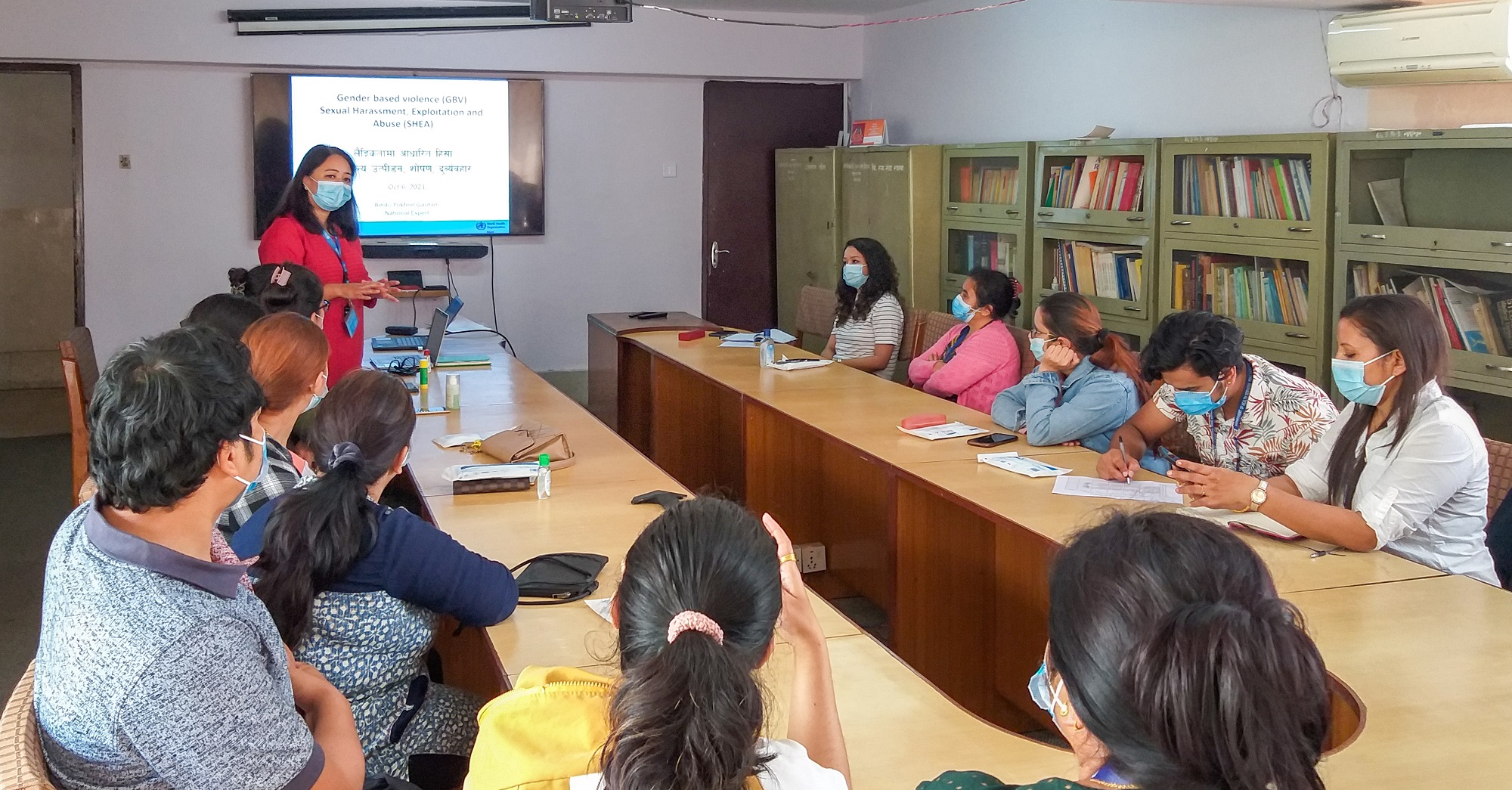
EDCD call center operators oriented on gender-based violence and sexual harassment
Kathmandu, Bagmati Province | October 6 - A one-day orientation program on gender-based violence, and sexual harassment, exploitation, and abuse, was organized for 46 call center operators working at Epidemiology and Control Division (EDCD), Ministry of Health and Population (MoHP). The operators pick up calls from 1115 and address public queries and concerns from all over Nepal, especially related to COVID-19; and also make outgoing calls to all COVID-19 positive cases for case management. The session, organized by EDCD, MoHP, with support from WHO, Country Office for Nepal, provided orientation to the call operators on gender-based violence and sexual harassment and exploitation. Process and mechanism for case reporting, recording, and referral were also discussed, alongside overall error management of both incoming and outgoing calls.

Oxygen concentrators and EMDT bags handed over to Karnali Province
Jumla, Karnali Province | September 13 - WHO Nepal today handed over 10 oxygen concentrators and 2 Emergency Medical Deployment Team (EMDT) bags to Dr. Rajiv Shah, Medical Director of Karnali Academy of Health Sciences (KAHS), and Dr. Anusmriti Pal, KAHS COVID-19 Focal Person. The bag, consisting of essential medical equipment for emergency support and response such as stethoscopes, sphygmomanometers (blood-pressure monitor), pulse oximeters, temperature guns, face shields, gowns, masks, and sanitizers, was provided as a joint contribution from WHO and the Ministry of Health and Population. The consignment also included spare parts for the concentrators and paediatric-sized nasal cannulas. Further 5 concentrators (supported by WHO Nepal); and 1 EMDT bag and a stretcher (supported by Handicap International); are also planned to be provided to KAHS in coordination with the Health Service Directorate of Surkhet.

WHO Nepal Facilitates Training of IMU Nepal App
Palpa, Lumbini Province | September 14 - WHO Nepal trained 33 participants, including local level CICT (Case Investigation and Contact Tracing) team members, health coordinators, and representatives from various development partners on the app - IMU (Information Management Unit) Nepal. On the app, participants will now be able to directly enter details on case registration and sample collection; laboratories will receive the samples via a unique code and dispatch the report; and health coordinators and other members of respective local levels can see the status of COVID-19 cases and initiate case investigation and contact tracing appropriately. The training was organized by Health Office, Palpa; and supported by Suaahara (program funded by USAID and managed by Hellen Keller International) and BES (Backwardness Eradication Society) Nepal.

Virtual Orientation on Scrub Typhus Held
Kathmandu, Bagmati Province | September 6 - WHO, Country Office for Nepal, organized a virtual orientation session on scrub typhus, a vector borne disease caused by a bacteria, Orientia tsutsugamushi, and transmitted to humans through the bite of an infected larval mites. The orientation sessions were provided to over 50 WHO field officers on the diagnosis, management, prevention, and control of scrub typhus in Nepal. The WHO field officers who are the first point of contact between WHO, Country Office for Nepal, and the health officials in the provinces/districts will now provide the first level support in their respective provinces for any technical matters related to scrub typhus. WHO will continue to support capacity building of health workers in Nepal for early diagnosis, proper management, prevention, and control of this disease which is increasingly being reported in Nepal in recent years.

WHO Nepal trains 3,667 healthcare workers on management of COVID-19 cases, especially for pediatric cases
Kathmandu, Bagmati Province | August 17 – 24 - The virtual sessions, organized with experts from the National Health Training Center (NHTC) and Nepal Pediatric Society’s, updated 3,667 healthcare workers on the latest global treatment protocols for proper management of COVID-19 patients, especially children. The trainings will enable the participants, including nurses, paramedics, medical officers, dentists, public health professionals, pharmacists, physiotherapists, medical/nursing students, to ensure uniformity in treatment in all layers of the health system. WHO experts developed the curriculum of the training, incorporating OpenWHO courses, and also provided financial support. WHO is also working with NHTC to develop a pool of trainers to conduct similar trainings throughout Nepal.

Support to Detect Alpha Variant of COVID-19 in Nepal
Kathmandu, Bagmati Province | August 16 - Since the onset of the pandemic, WHO, Country Office for Nepal, has been working with the Ministry of Health and Population, to enhance Nepal’s lab capacity by providing technical expertise and resources in COVID-19 diagnostics, SARS CoV-2 variant detection, and surveillance. Recently, WHO, Country Office for Nepal, handed over gene sequencing equipment, reagents, and SARS-CoV-2 RT-PCR kits capable of detecting Alpha variant to the National Public Health Laboratory.

WHO supports the digitization process of COVID-19 vaccination records
August 6, 2021 | The joint project of WHO, Country Office for Nepal, and UNDP Nepal, and led by Ministry of Health and Population (MoHP), is being implemented in 7 selected municipalities of 7 provinces. In this regard, WHO, Country Office for Nepal, recently handed over 120 tablets to the MoHP in order to facilitate the vaccine registration process. Digitization of vaccine registration is expected to reduce hassle and crowding during vaccination sessions, and also support in ensuring equitable allocation of vaccines.
